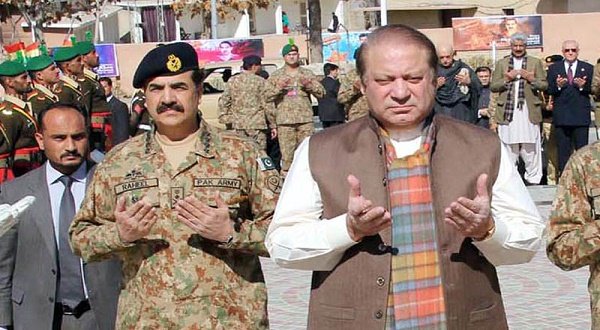

Pakistan’s much talked about National Action Plan to tackle terror overburdens the military while undermining the role of parliament and judiciary
GEN MIRZA ASLAM BEG
[dropcap]T[/dropcap]he 21st Amendment to the Constitution has given us the Twenty Points National Action Plan, purported to root out terrorism from Pakistan, which reached brutal climax on 16th December 2014, causing great shock, pain and anger to the nation.
The reaction was natural, demanding corrective and punitive action. Quite often, one takes actions under pressure of grief and anger, which prove counterproductive. The recent example is that of the erratic decision by the Americans, to invade and occupy Afghanistan, after the 9/11 terror, which proved counterproductive, humiliating and disastrous because, Washington’s policy was predicted on two inaccurate assumptions: that “all problems can be solved militarily and that the solution US policy makers envisage, is necessarily right.”
Our Action Plan appears to suffer from such assumptions. The National Action Plan empowers the military, ‘the performing institution’, whereas the government is characterized by its ineptitude and poor performance.
The performance gap, thus would widen, creating the 1976 and 1998 like situation, when of necessity, military courts were established by the elected governments, but were soon struck down by the judiciary, and the same judiciary didn’t hesitate for a moment to award the “law of necessity,” when the military struck.
The military is also being over-burdened with responsibility and the resultant over-stretch may harm the interests of both, the country and the military. The emphasis is on the military courts and the military will deliver, no doubt, but what about the remaining nineteen points? The angels are not going to descend from the Heavens to deliver, to keep the nation’s hope alive.
The legal authority awarded to the military seriously undermines the judiciary. This over-stepping would be detrimental to the cause of both the institutions. Whereas there was the need that the Action Plan, should have come up with ideas to correct the delays in dispensation of justice and the development of modalities to deal with corruption. Since it is the question of independence of the judiciary, the superior judiciary, however, could strike down the constitutional amendment, if it found it in contraction with the basic structure/principles of the Constitution.
The parliament abdicated its right in favor of the APC, which drafted the 21st amendment to the Constitution. The parliament approved it without much of a debate. If there were any dissenting voices, they preferred not to attend the session.
Indeed, a very simple way of dealing with matters of such national importance, which is a serious reflection on the parliament itself which has failed to guard its sovereignty, which is the cornerstone of a democratic order.
The legal definition of a terrorist and a law breaker is, “the one who takes the law into his hands by causing harm/punishment to another person, without any legal authority.”
Yet the Action Plan is discriminative in identifying the terrorists and has placed the 34 outlawed organizations under the ambit of the 21st amendment, whereas 16 nationalist outlawed organizations have been exempted, “giving the impression that religion is the root cause of all the terror in Pakistan, which is a reflection of a ‘terrible mindset.”
It highlights the socio-political and ideological split of our society into liberals/seculars; the moderates; the nationalists and the religious parties.
The liberals/seculars are in majority and hold dominating political power. The moderates though representing the ruling party are weak and indecisive.
The nationalists are in revolt and the religious group is the marginalized lot, having no political space or a role in policy decision-making related to governance. Yet they have been identified as the prime source of terror in the country. Do we have authentic statistics, to justify such vilification?
The consequences of this “terrible mindset” may create a Parachinar like situation, where the tribesmen from across the neighboring countries joined the forays, with the result that almost for five years, Parachinar remained cut-off from the mainland, till the military moved-in to regain control, at a heavy cost.
Similarly the “ten percent area of North Waziristan”, which the military is trying to secure for the last few months, is being reinforced by the Taliban from Afghanistan. And with the drawdown of the occupation forces, the Pak-Afghan border is now open, enabling the ‘Good Taliban’ to join the ‘Bad Taliban,’ facing the Zarb-e-Azb onslaught.
The situation is thus developing into a two front security problem for Pakistan, which suits India. Under such trying conditions, the unprovoked aggression by the Indians across the Line of Control, aims at testing our nerves.
Our internal conflict is getting more complex and menacing, demanding a pooling up of all our resources and stretch of imagination, to figure out, what could possibly be done to fortify our National Purpose as defined in the Constitution: “Pakistan will be governed by a democratic order, based on the principles of Quran and Sunnah.”
Yet, democracy is preferred over the principles of Quran and Sunnah, which remain blurred and ignored. No government in the past or the present one nor the conglomeration of religious parties have ever made any serious attempt to fortify our ideological frontiers.
“If that be so, and our human existence is not to be God-centered human order, but the modernity preferred order, that favors individual autonomy and marginalized God. Not God first but We First”, then we need to hold another All Parties Conference to draft the 22nd Amendment to the Constitution, which the parliament would obligingly approve. That is an option and may be the easy way out of this very complex situation.
It would then be possible to rename Pakistan as the Peoples Republic of Pakistan. Bangladesh is a living example. But Pakistan is different. God forbid, if that situation is reached, Pakistan may turn into a “regional cockpit”, like Parachinar, to meet the fate of Yugoslavia.